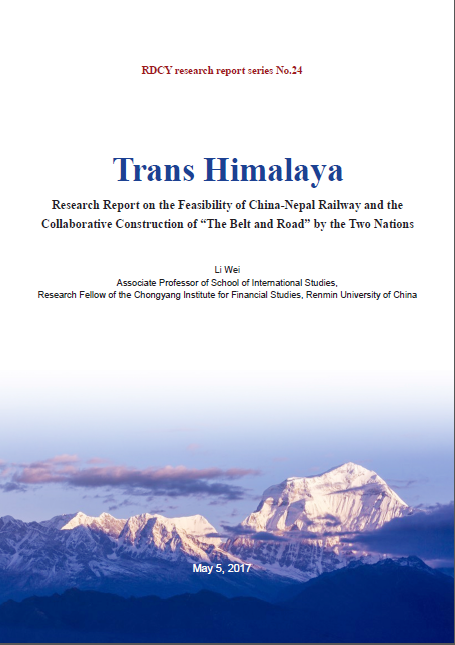Reports
Your Present Location: PUBLICATIONS> ReportsRDCY Research Paper No. 24: Trans Himalaya—Research Report on the Feasibility of China-Nepal Railway and the Collaborative Construction of “The Belt and Road” by the Two Nations

Core tips
On March 27, 2017, Chinese President Xi Jinping met Prachanda, Prime Minister of Nepal; they reconfirmed to solidly promote interconnection, free trade agreement and other economic measures with “The Belt and Road” co-building as the opportunity. Thereinto, considering the various strategic values, sound feasibility for implementation and basically mature line selection scheme of China-Nepal Railway, China shall advance this project as soon as possible. Investigators carried out field research on operation of Qinghai-Tibet Railway and visited many people concerned; they analyzed the meaning, feasibility, line selection scheme of China-Nepal Railway and gave some policy proposals on the construction.
※ In terms of economy, China-Nepal Railway can help drive the development of southern region of Tibet, staff exchanges and goods transportation between China and Nepal, Chinese tourists to Nepal and the surrounding usage of RMB.
※ In terms of diplomacy, China-Nepal Railway can help push development of China-Nepal relations and bring Nepal closer to China in strategy selection.
※ In terms of society, China-Nepal Railway can help strengthen cultural and educational exchanges between the two countries, and promote development of Chinese Buddhist culture.
※ In terms of geographical relationship, China-Nepal Railway can help propel “The Belt and Road” initiative and the construction of South Asia Economic Corridor, and open the portal of China to South Asia.
※China’s experience and technology in plateau railway construction can fully meet the technical demand of China-Nepal Railway construction, and the operation of Qinghai-Tibet Railway ensures China’s incomparable advantages in plateau railway construction.
※China-Nepal Railway has considerable “spillover benefits”, with relatively low political risks.
※The Nepalese is friendly to Chinese people and China-Nepal Railway will not bring substantially negative influence to China’s cultural and religious security.
※The cost of China-Nepal Railway is quite high, so construction fund shall be collected in multiple ways, including seeking for loans of Multilateral Development Banks and Silk Road Fund.
Preface
Recently, China has conducted influential “railway diplomacy” and actively pushes railway construction in foreign countries. The foreign minister of China Wang Yi pointed out: “where the railway reaches, where China’s influence can extend”. Obviously, railway construction has acted as important wings of China’s economy take-off; while it has also become the entry point of China’s great-power diplomacy to push railway construction in foreign countries. In history, the Tazara Railway built in 1960s and 1970s is significant for China to win reputation among developing countries; currently, as “The Belt and Road” strategy advances, “railway diplomacy” has become the important means for China to improve reputation and create an amicable and prosperous neighborhood.
China’s “railway diplomacy” shall keep balance in economic value and strategic target, and center on specific regions and countries, instead of full covering. To be specific, besides countries cooperating in railway projects with China, China shall focus on surrounding countries to advance “railway diplomacy”. For Indo-China Peninsula, its geological conditions are simple and the low mountain terrain runs through south and north, which is suitable for long-distance south-north railway; moreover, this area is densely populated, the economy develops rapidly, which is of outstanding economic value; besides, its political order is basically stable and most of its countries have close diplomatic relations with China, thus, it takes priority for China to advance “railway diplomacy”.
Besides accelerating the railway construction of Indo-China Peninsula, China shall connect Shigatse to Katmandu (China-Nepal Railway) as soon as possible; this has positive significance not only to the economic and social development of China and Nepal, but also the important diplomatic and geopolitical value. Based on field investigation and related interview, this report is for reference by government departments or academic institutes.
Key Words: Belt and Road; railway; Nepal























































































 京公网安备 11010802037854号
京公网安备 11010802037854号





